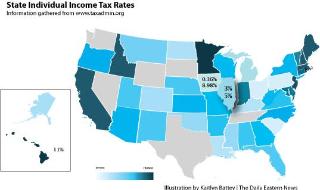Tax increase may or may not affect Illinois
On Jan. 13, Gov. Pat Quinn signed to increase the personal and corporate income tax for Illinois from 4.8 percent to 7 percent for corporations. Some believe the increase will push businesses out of Illinois while others believe it will not.
Dan Hickman, a professor in the economics department, said the income tax increase will cause Illinois to lose business.
“I think my overall opinion, I guess, of the income tax, would be at this point a necessary evil,” Hickman said.
He said some companies may have to cut jobs or move outside of the state because of the raised income tax rate.
“It will mean losing some jobs and losing some business in the short term,” Hickman said.
The increase could hurt businesses now, Hickman said, but if the tax was not raised it could create an even greater impact on companies in the future.
“In the long run, if you don’t do something drastic like this, it’s going to be much worse in the future in terms of businesses leaving and jobs being lost,” Hickman said.
Andrew McNitt, a professor in the political science department, said the income tax increase would not cause companies to move.
He said businesses would lose money if they were to relocate. Costs to move businesses would, in McNitt’s opinion, be more expensive than paying for the tax increase.
Cutbacks would also hurt businesses, McNitt said, because if they want to expend earnings, corporations will need more workers.
Even though the increase may or may not affect companies, the rate that Illinois companies will be charged is currently in the middle range of taxes.
“Essentially the maximum tax we will be charging is lower than 41 of the states even after we raise it,” McNitt said.
He said the increase is somewhat uncomfortable, but is not a burden.
“Do I think it’s going to cripple Illinois business? No,” McNitt said.
McNitt said the increase should help keep Illinois from going further into debt, but the state still isn’t out of the woods.
Teshome Abebe, a professor within the economics department, said the state government could have done more in the past to prevent Illinois debt.
He said the government could have taken more steps in 2006 or 2007 to have a lesser deficit.
“We have now taken seemingly appropriate steps even if the force of the punch we could have delivered could have been a bit more robust,” Abebe said.
Hickman also said the government could have prevented the debt they are in.
He said in the past when the economy was better, the government found new programs to invest their extra money in. He said he thinks the government should have saved the money for when they needed it.
“They don’t have the forward looking thought,” Hickman said.
Sam Bohne can be reached at 581-2812 or shbohne@eiu.edu




































































